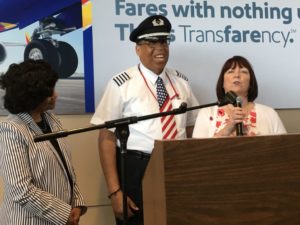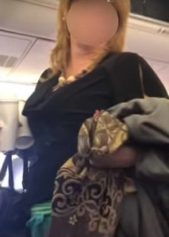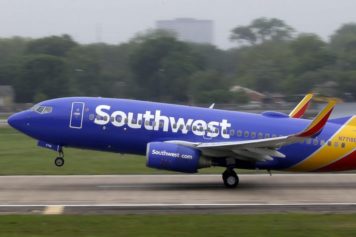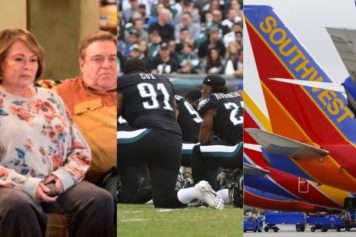
Capt. Lou Freeman has served Southwest Airlines for 36 years. (Photo by Maudlyne Ihejirika/Sun-Times)
African-American pioneer pilot Capt. Louis Freeman got quite the surprise Thursday, June 8, when he disembarked the Boeing 737 he had flown into Chicago’s Midway International Airport from Dallas, Texas, earlier that day. Crowds of people earnestly awaited his arrival as the trailblazing pilot took his final flight on what’s now dubbed as Capt. Louis Freeman Day in the city of Chicago.
Freeman, the first Black chief pilot to serve at any U.S. airline, retired Thursday, according to the Chicago Sun, leaving behind a legacy of firsts. The pioneer pilot was the first African-American pilot at Southwest Airlines and the first Black ROTC cadet corps commander back in high school.
At his send-off, close friends, family and Southwest employees described the now-65-year-old as encouraging and a man who truly cared about others.
“He’s just a really inspiring person,” said Betty Greene, Southwest’s manager of community affairs, who was hired just three months before Freeman was brought on as a pilot on Nov. 10, 1980. “Lou is such a mentor, someone that everyone looks up to … He’s very down to earth, very genuine, really wants to help others.”
“He’s friendly. He’s kind,” Greene continued. “He’s one of the first adopted pilots in our adopt-a-pilot program, where pilots work with fifth- and sixth-grade students, teaching them about geography, aviation, principles of flight, just a great man.”
Born in Austin, Texas, Freeman and his family moved to Dallas at the height of the civil rights movement when he was just 10 years old, the Chicago Sun reported. Just a year into his high school career, Dallas integrated its schools, leaving the future aviator as just one of only a dozen Black students out of 1900 at Woodrow Wilson High School.
Freeman shined in band and ROTC, however. He did so well that his ROTC leader fought to make him commander, despite fellow faculty members’ reservations that the ROTC cadets wouldn’t follow an African-American student.
“Not only did they follow, our unit excelled,” Freeman told the newspaper.
He later joined the ROTC Air Force unit at what is now Texas A&M-Commerce and took the Air Force exam. He passed all but the pilot section, prompting him to study aviation on his own.
“During that year, I fell in love with the idea of flying airplanes,” he said.
Freeman re-took the exam and passed the following year, later accepting a scholarship to the Air Force Academy, where he met his wife, according to the Chicago Sun.
“Lou was a pilot in the Air Force. I was a radiologist,” said Freeman’s wife, Stephanie Woodfork. “We dated for five years. I remember when he was hired for Southwest in 1980, I waved goodbye to him, and he drove off in this car. I said, ‘Well, that’s the last time I’ll see of him,’ because he was going to Texas.”
“But we stayed together,” she continued. “Whenever he was off, he’d fly to California. I was in L.A. at the time, doing my residency. We married July 24th, 1982.”
Just three years after being hired, Freeman became Southwest’s first Black captain. He went to serve the airline for 36 years. The newspaper reported that Freeman selected and led the three-pilot crew that flew the body of late civil rights icon Rosa Parks on her final tour in October 2005.
“When we flew into Montgomery, Alabama, a place that once used high-pressure fire hoses to block African-Americans from peaceful protests during the Civil Rights Movement, we were greeted with a water cannon salute to honor Rosa Parks,” Freeman recalled. “We even wiggled our wings as Ms. Parks’ final goodbye as we departed Montgomery.”
The retired pilot, who actively volunteers for the Tuskegee Airmen’s organization, was greeted with his own water canon salute by the Chicago Fire Department as his flight pulled into the airport Thursday. He was met with deafening cheers, applause and high fives from hundreds of supporters.
“I enjoyed my trip from Dallas to Chicago. I wanted to savor every moment,” Freeman told the Chicago Sun after accepting his proclamation. “I cannot believe the outpouring and love that I see and feel here.”
“I always have thought myself to be just Lou. Just Lou,” he added. “Simply that. But I found out in the last month or two months or so, that maybe I’ve been a little bit more than just Lou, that maybe I’ve been able to touch you and you and you. And that makes me happy.”


